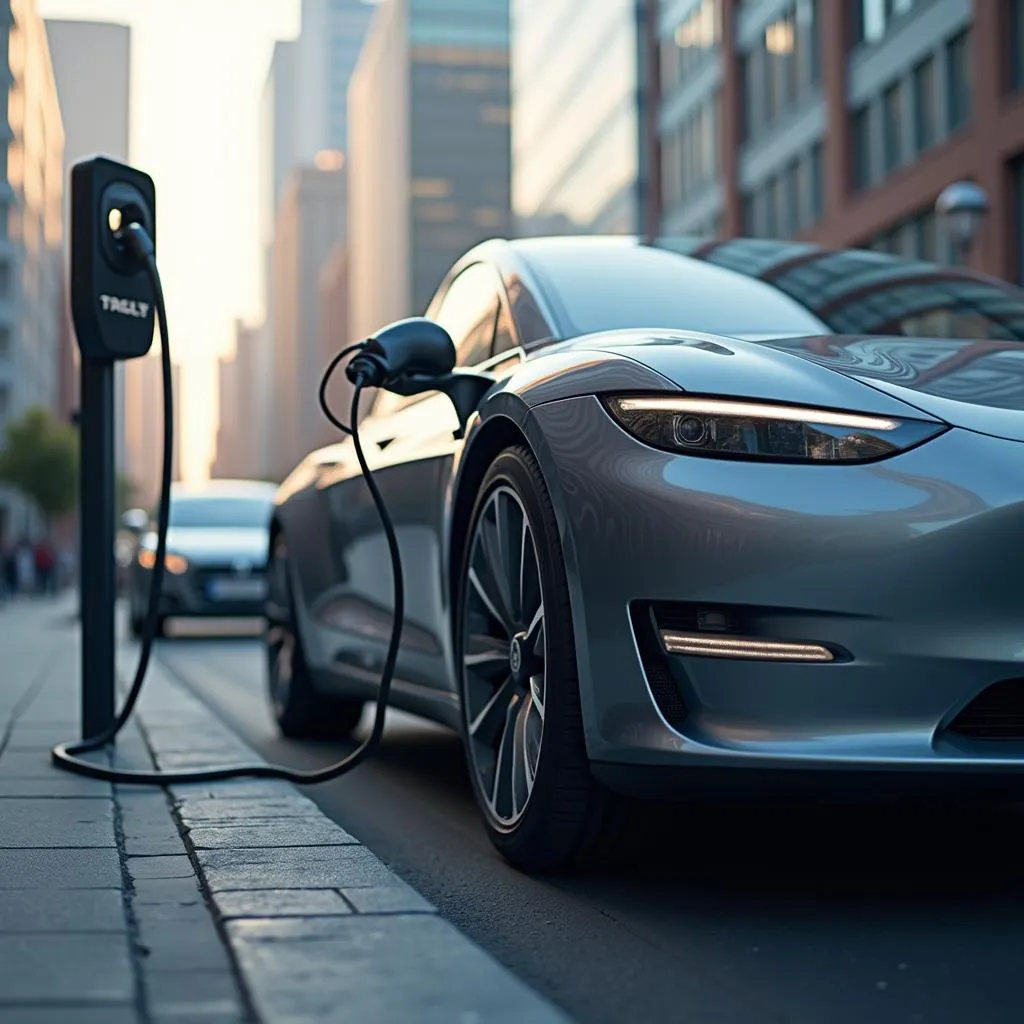Imagine this: you hop into your car, start the engine, and instead of the familiar roar of a combustion engine, you’re met with a near-silent hum. This is the reality for more and more drivers as battery-powered cars, or electric vehicles (EVs), become increasingly common on the roads. But what exactly is a “battery car,” and what do you need to know about this revolutionary technology?
Just a stone’s throw away from bustling city streets, you can find enthusiasts tinkering with their cars, adding modifications like a solar charger for their battery car. This innovative approach to charging is just one example of the growing interest in sustainable transportation solutions.
Deconstructing the Term “Battery Car”
While the term “battery car” is a colloquialism, it effectively captures the essence of an electric vehicle. Unlike traditional gasoline-powered cars, battery cars rely solely on electricity stored in a high-voltage battery pack to power an electric motor, which in turn drives the wheels.
From an automotive expert’s perspective, the shift to battery cars represents a paradigm shift in car design and mechanics. No longer are we dealing with complex internal combustion engines, spark plugs, and exhaust systems. Instead, we have a streamlined system centered around the battery, electric motor, and power electronics.
The Ins and Outs of Battery Cars
So, how does a battery car actually work? It’s simpler than you might think:
- Charging: The battery is charged by plugging it into an external source, much like you would charge your phone.
- Energy Storage: The battery stores the electrical energy until it’s needed to power the vehicle.
- Power Delivery: When you press the accelerator, the battery releases stored energy to the electric motor.
- Motion: The electric motor converts electrical energy into mechanical energy, turning the wheels and propelling the car forward.
This simplified system offers several advantages over traditional gasoline cars:
- Environmental Friendliness: Battery cars produce zero tailpipe emissions, contributing to cleaner air and a healthier planet.
- Cost Savings: Electricity is generally cheaper than gasoline, resulting in lower running costs over the vehicle’s lifespan.
- Performance: Electric motors provide instant torque, leading to quicker acceleration and a more responsive driving experience.
Addressing Common Questions and Concerns
Despite their growing popularity, battery cars are still shrouded in questions and misconceptions. Here, we tackle some of the most frequently asked questions:
What is the range of a battery car?
The range of a battery car varies depending on the model and battery capacity. However, many modern EVs offer a driving range of 200 miles or more on a single charge, enough for most daily commutes and even longer journeys.
How long does it take to charge a battery car?
Charging times depend on the charging station and the battery’s capacity. Public fast-charging stations can provide a significant charge in under an hour, while home chargers may take several hours for a full charge.
Are battery cars reliable?
Yes, battery cars are generally very reliable. With fewer moving parts than gasoline cars, they require less maintenance.
What happens if the battery runs out of charge while driving?
Running out of charge, often referred to as “range anxiety,” is a valid concern for many potential EV buyers. However, most modern EVs come equipped with sophisticated range prediction systems that provide ample warning and help you locate nearby charging stations.
As Professor Emily Carter from Stanford University, a leading expert in sustainable energy solutions, aptly puts it, “The future of transportation lies in breaking free from our dependence on fossil fuels. Battery electric vehicles are a crucial step in that direction.”
Exploring the World of Battery Cars
If you’re interested in learning more about specific types of battery chargers, be sure to check out our article on Dewalt car battery chargers, which delves into the features and benefits of these powerful and reliable charging solutions.
From understanding the basics of how they work to addressing common concerns, we hope this article has shed some light on the exciting world of battery cars.
Need Help with Your Diagnostic Tool Setup?
As experts in automotive diagnostics, particularly in European car systems, we understand that navigating the world of car technology can be daunting. If you’re facing challenges setting up or using your diagnostic tools, don’t hesitate to reach out to us via WhatsApp at +84767531508. Our team of experienced automotive technicians is available 24/7 to provide you with the support you need.
Remember: The future of driving is electric, and understanding the intricacies of battery cars is key to embracing this exciting new era.



